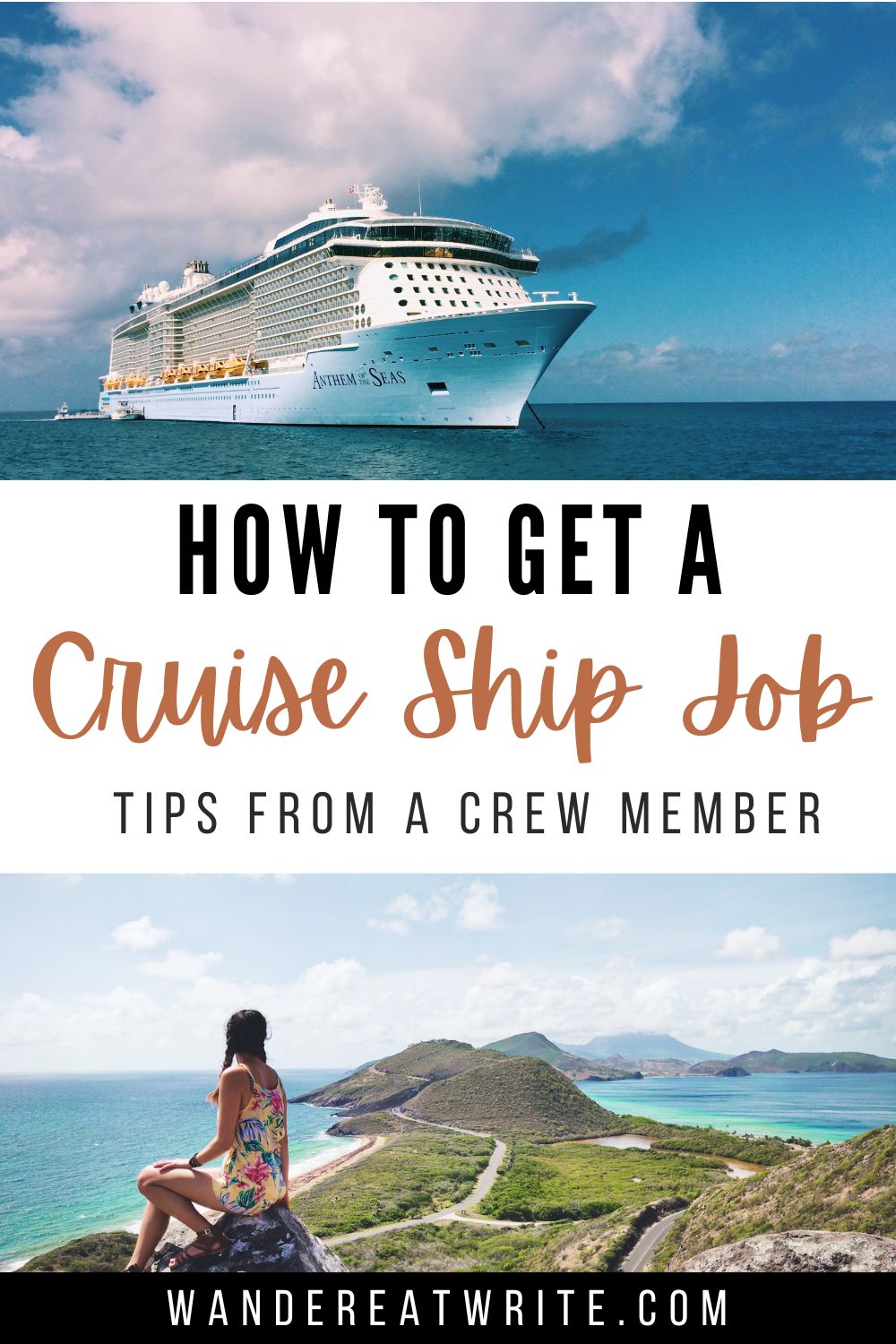Wondering how to get a job on a cruise ship but don’t know where to start?
Say no more.
After working on cruise ships for three years, I’m here to break it all down for you, step by step, so you don’t have to spend painstaking hours researching.
With so little information online about working as a crew member on cruise ships, I know how frustrating it can be to try to break into the industry with no guidance.
But I’m here now and I’ve got all the answers for you.
In this guide, you’ll learn not only how to get hired on a cruise ship, but which websites to apply to and which recruiting companies are available in your country.
All aboard– full steam ahead!
About Me and How I Can Help You
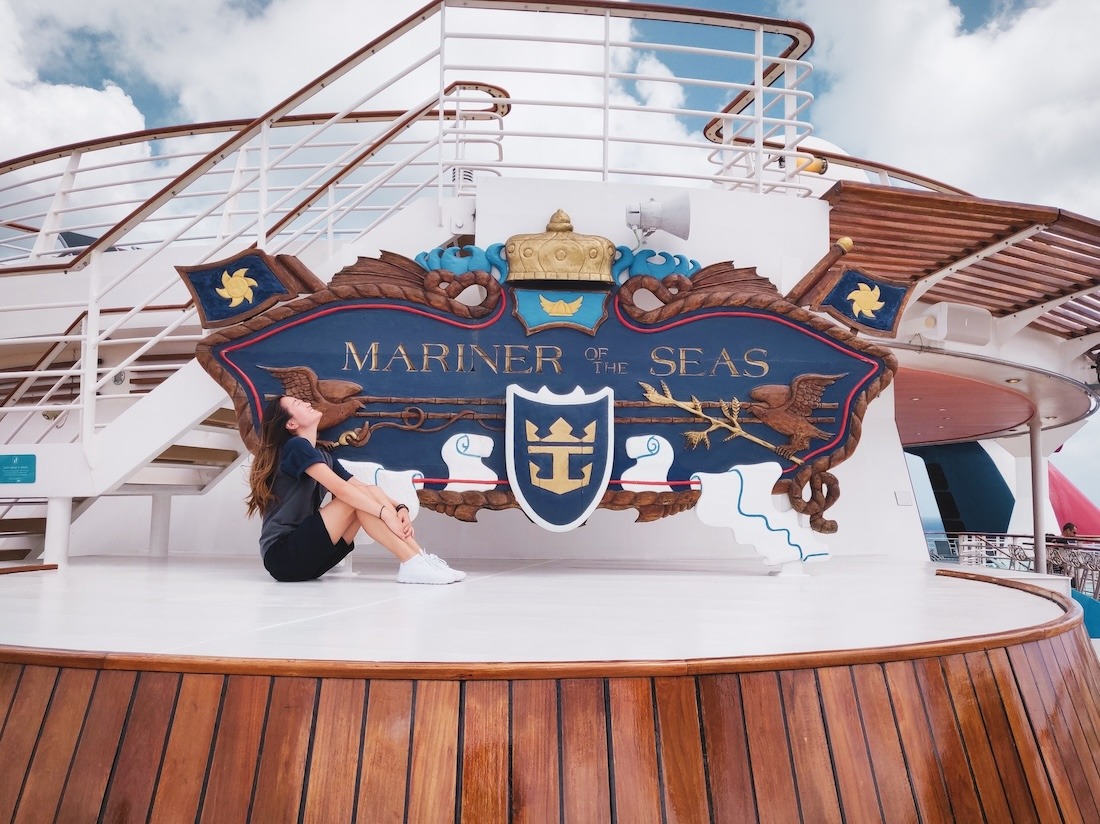
A quick intro about me: Hi, I’m Michelle, and I’ve worked all over the world since 2013.
With three years of onboard experience working on cruise ships, I know what it takes to land a job in this unique industry.
My time at sea has given me insight into the hiring process, onboard life, and the skills needed to excel in various roles aboard.
Besides my experiences with ships, I’ve been fortunate to come across job opportunities that have taken me to every continent, even working in Antarctica.
Needless to say, I’m quite familiar with securing travel jobs abroad.
10+ years ago when I began this journey around the world, there wasn’t much information online about how to get paid to travel.
Now, with nearly 70 countries and all seven continents under my belt, I’ve taken the guesswork out and am here to tell you exactly how, step by step, to turn your dream of working on a cruise ship, into a reality.
How to Get a Job on a Cruise Ship
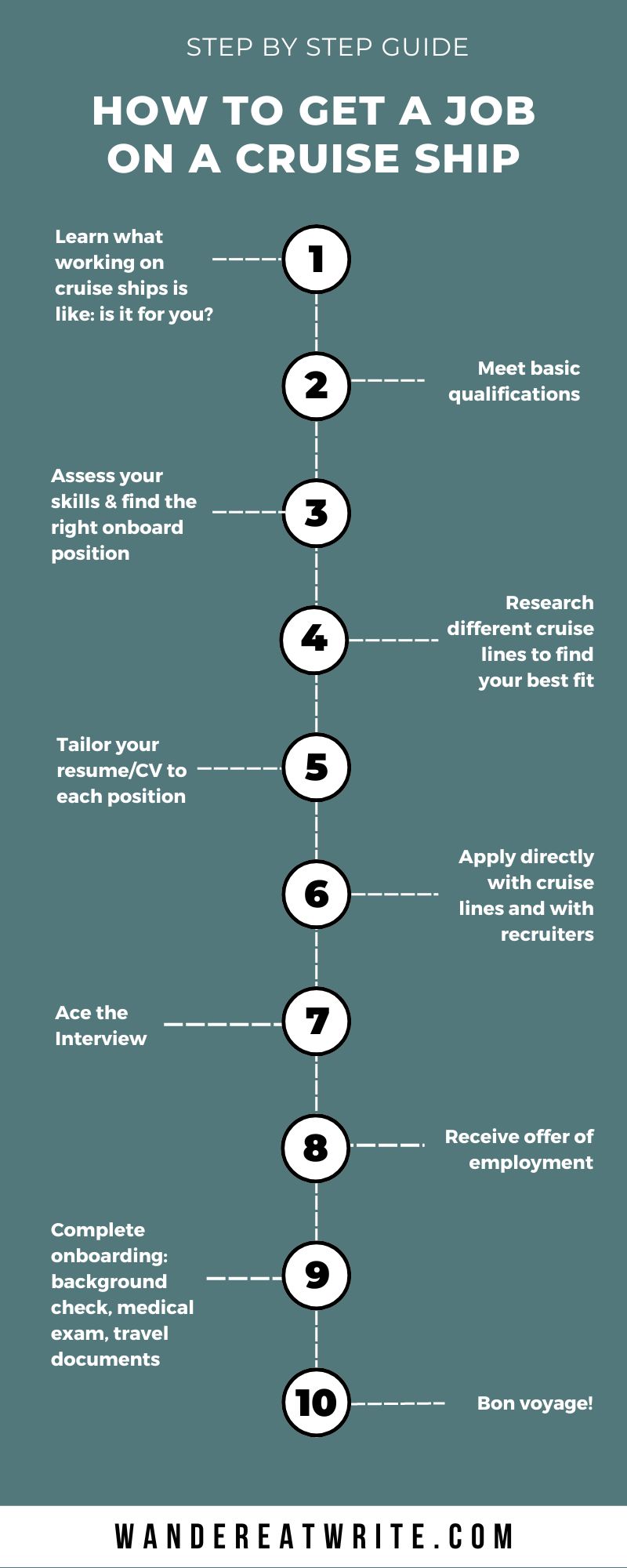
Step 1: Know What Working on a Cruise Ship is like
Working on cruise ships means you get paid to travel.
Who wouldn’t want a job like that?
In my time working on ships as a cruise ship crew member, I got to visit 35 countries.
But it’s important to know the reality of what life onboard entails.
I’ve seen new hires come onboard only to realize– after leaving their former jobs, saying goodbye to family, and packing up their lives– that life on ships just isn’t for them.
So what’s working on cruise ships really like?
I’ve put together all the pros and cons of working on cruise ships, which is a great place to start in your cruise ship job search.
To sum up ship life:
Pros
- You get paid to travel
- Accommodations, meals, and medical care are covered during your contract
- International work experience and connections
- Potential to save the majority of your salary with few expenses
Cons
- Work hours are long with no days off
- Contracts can be 4-9 months long
- You’ll probably have a roommate in a small cabin
- The crew food options may be different from what you typically eat
- You won’t always get to go into port every time the ship is anchored
- You might have to pay for ship Wi-Fi
💡 Want to hear more about what life on ships is like? Check out this interview I did with my friend Charmaine.
Step 2: Meet Basic Qualifications
Once you’ve researched life on ships and decided this is still the right path for you, you’ll need to meet the basic qualifications that most cruise lines will require.

Between Ages 21-50*
“*” because there are exceptions to this.
It is possible to get hired outside of this age bracket, but it can be more difficult.
The only crew members I’ve seen under 21 years old are usually entertainers.
But at the bare minimum, you need to be at least 18 for legal purposes.
For most other positions, there are educational and work experience requirements that typically aren’t found in adults any younger than 21 years old.
Now if you’re on the other end of the age spectrum, it’s just a matter of how healthy you are.
Another requirement for working on ships (which I’ll talk about later) is that you pass the medical exam.
The further away from 50 you are, the harder it usually is to not only pass the medical but also fulfill your role in onboard emergencies as a crew member.
I will say that I know many people over 50 years old working on cruise ships– so don’t lose hope.
You just need to make sure you are physically healthy enough, both in real life and on paper, to live and work on cruise ships.
Language Fluency
For most cruise lines, you’ll need to have a high fluency of English as this is the international language of the seas.
You should be able to not only communicate politely with guests in English, but also able to report emergencies clearly and quickly.
Some cruise lines also require a second or third language ability due to the itinerary or guest clientele.
Keep this in mind when you are applying for cruise ship jobs as you may be better suited for certain companies depending on your language skills.
For example, Italian cruise line Costa vs German cruise line AIDA.
Clean Criminal Background
The cruise line will do a background check either before or after your offer of employment.
You’ll need to pass this check before you’re given a contract.
Valid Passport
You need a passport to work on ships as you’ll probably need to leave your country to join the ship and you’ll also be docked in other countries during your contract.
It’s best to have a valid passport before you start applying for cruise ship jobs as some applications may have a filter question that asks if you have one.
If you don’t have one, your application might not pass the initial screening.
💡 Tip: Getting a passport can take anywhere from a few weeks to a few months. If you don’t already have a passport, you can apply to cruise jobs that don’t inquire about your passport status, take note of the ones that do, and apply to those after you have a passport.
Medically Healthy
As I mentioned before, you need to pass a medical exam before you are officially given an onboard contract.
The requirements vary by ship, but most will include a general physical exam, blood work, vision test, and chest x-ray at the bare minimum.
Being in good health is more important while working at sea compared to working on land for a few reasons:
- If you have a medical emergency, the closest hospital can be hours away
- Living quarters and passageways onboard are crammed and narrow
- Most jobs on cruise ships require you to be on your feet for most of the day
- Crew members are required to assist in the event of emergencies
- During emergencies, crew members need to be able to reach their muster stations within several minutes and without the use of elevators
Job-Specific Certifications
Some shipboard positions may require you to have specific certifications.
This is something to keep in mind when you’re deciding which jobs to apply for.
Examples include:
- Lifeguard: First Aid/CPR certification
- Youth Staff/Counselor: Degree in teaching or childcare
- Food and Beverage: Food handler’s certification
Ship Certifications
Not all cruise lines expect you to have the required certifications to work at sea.
In fact, some cruise lines– like Royal Caribbean– train and certify you once you’re onboard which saves you time and money before your contract.
However, if you want an advantage over other prospective crew members and want your application to stand out, getting the following certifications ahead of time so that you can put it on your resume is a great idea:
- STCW Basic Safety Training
- First Aid/CPR
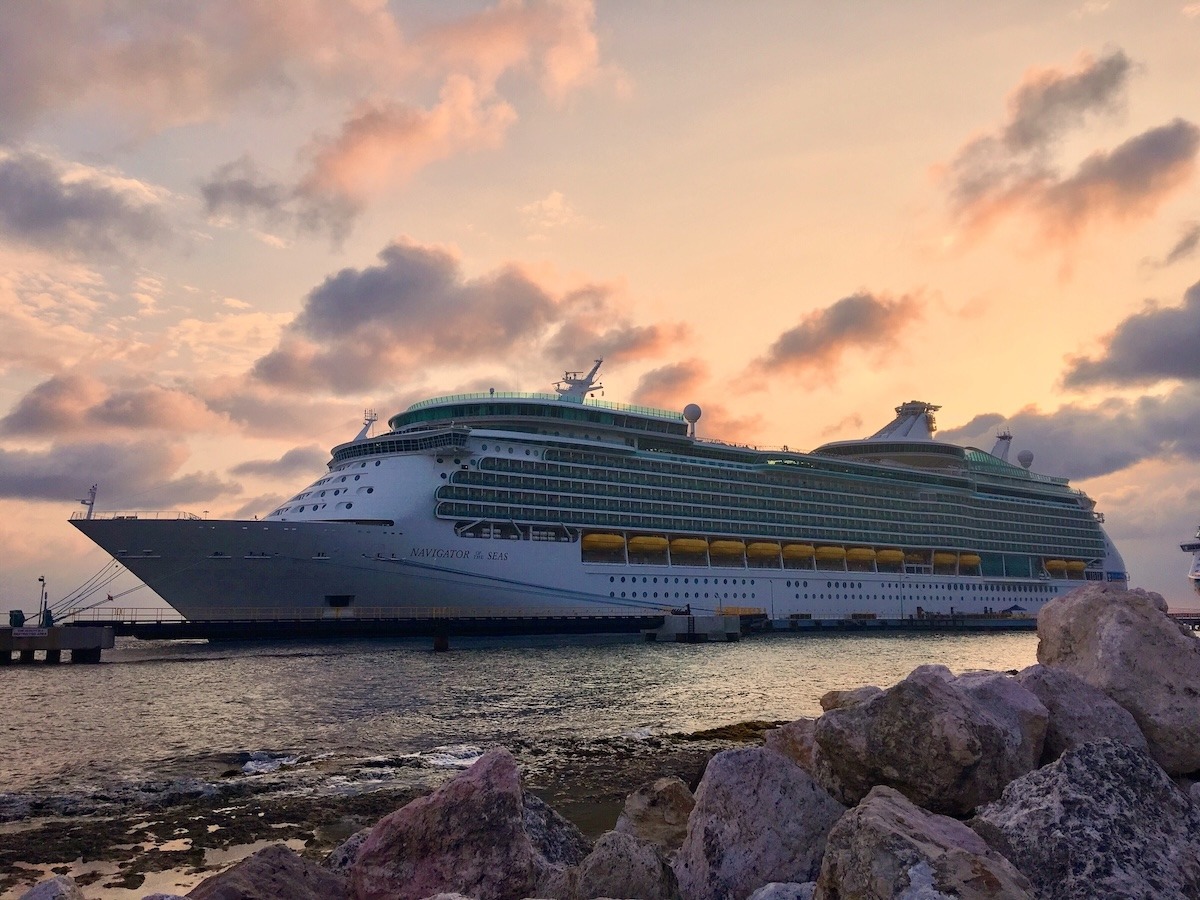
Step 3: Assess Your Skills & Find the Right Onboard Position
What cruise ship jobs can you do or have experience in?
Assess your skills and pin point which jobs are the best fit for you.
If you’re not sure what roles are available on cruise ships, think of these marine vehicles as floating resorts, hotels, or even a small village.
Any job that is needed to keep a remote town running will be found on a ship.
Jobs Available on Cruise Ships
So exactly what jobs are available on cruise ships?
Ship Jobs by Rank (Stripes)
Crew members are split into three categories/ranks: officer (highest), staff, and crew (lowest).
The jobs that come with these ranks reflect the amount of education and experience needed to fulfill these roles.
Here’s an example list of shipboard positions in each rank:
- Officer: Captain, chief officer, safety officer
- Staff: Entertainer, activity staff, youth staff, sports staff, shore excursion, future cruise sales, guest service officer
- Crew: Stateroom attendant, cleaner, restaurant host, bartender
Ship Jobs by Department
Positions on ships are also categorized into three general departments: hotel/entertainment, marine/technical, and crew services.
The hotel department can be seen as the ship’s front-of-the-house, or more guest-facing services.
The marine and technical departments are mostly behind the scenes and their purpose is to safety navigate the ship to each destination.
Crew services are just a few members onboard who provide assistance to crew members such as HR and admin positions.
Hotel:
- Casino
- Entertainment
- Facilities
- Finance
- Food and Beverage
- Guest Activities
- Guest Relations
- Hotel Management
- Housekeeping
- Information Technologies (IT)
- Inventory
- Medical
- Onboard Marketing
- Lifeguard
- Photo
- Retail
- Sales/ Future Cruise
- Shore Excursions
Marine:
- Deck
- Electrical
- Engine
- Officer
- Security and Safety
Crew:
- Administration
- Human Resources
Step 4: Get to Know the Different Cruise Lines
Doing as much research about the cruise industry will help prepare you when you finally get a contract offer.
The more you know and the earlier you know it, the easier it will be to adjust once onboard and the fewer surprises you’ll run into.
One of the most important things I found after working on ships that most people don’t think about is that each cruise line has its own reputation and serves a different demographic– and these things can affect your experience as a crew member.
For example, Virgin and Royal Caribbean are often considered the best cruise lines to work for among crew members.
Regarding guest demographics, Carnival offers many budget-friendly cruises that can attract a rowdier crowd, especially the shorter the itinerary is.
Similarly, any affordable family-friendly cruise line (Disney, Royal Caribbean, Carnival, and Norwegian) means you’ll have to deal with upwards of a thousand children onboard during high season.
Working for a luxury cruise line like Silversea or an adults-only line such as Virgin might relieve you of kids running amok, but these cruises also mean you may get an older/elderly demographic that’s more entitled or demanding.
Regarding itineraries, smaller ships typically have better options because smaller ports can accommodate their size.
As a crew member on these ships, you’ll be able to visit more unique ports of call.
However, smaller cruise lines mean fewer crew positions.
Mega cruise ships on the other hand offer a better chance at employment, but their itineraries may be limited to only larger ports.
While you don’t usually have much of a choice when it comes to which cruise line that hires you, these factors are something to keep in mind.
Step 5: Tailor Your Resume
While you may be tempted to send the same resume you have saved on your computer to every cruise ship job posting– don’t.
As a former hiring manager, I can tell you that many– if not all– of these application programs automatically filter out resumes and CVs that don’t match basic requirements or keywords.
This means that if your resume/CV doesn’t include certain words or phrases, a human hiring manager will never see your application.
So make sure you do the following before you send off your resume:
- Read the job description and take note of key phrases and requirements
- Incorporate these words into your resume
- Make sure you show that you meet the requirements in your resume
Some other general resume tips:
- Name the file something simple and professional that makes sense (ex: John Smith Resume)
- Don’t write in paragraphs; use bullet points
- Keep the resume as short as possible (2 pages max)
- Edit for grammar and spelling

Step 6: Apply (and Where to Apply)
There are generally four ways to apply for jobs on cruise ships: either directly on the company’s career page, through recruiters, via contracting companies for certain positions, or on cruise job boards.
Applying Directly to Cruise Lines
Here’s a list of the main cruise lines and their hiring pages for onboard positions:
- AIDA
- Azamara
- Carnival
- Celebrity
- Costa
- Cunard
- Disney
- Holland America
- MSC
- Norwegian
- Oceania
- Princess
- Regent Seven Seas
- Seabourn
- Silversea
- Royal Caribbean
- Viking
- Virgin Voyages

Applying Through Recruiters & Hiring Partners
Recruitment companies and authorized hiring partners are probably the best way to get a job working on cruise ships.
I never head back about my application when I applied directly on the cruise line’s hiring pages, but ended up with my first ship contract due to a recruiter.
Recruitment companies have the time and resources to place you, and often there are recruiters hired specifically to work with your nationality.
Be Aware of Scam Recruiters
However, be aware that scam recruiters are, unfortunately, rampant.
If you are contacted by a recruitment agency, do your best to ensure that they are legitimate.
A real hiring manager or recruiter will NEVER ask you to pay to apply for a position.
You can also find a list of each cruise line’s official and authorized hiring partners at the bottom of their career’s page.
List of Recruitment Companies for Cruise Ship Jobs
Here’s a list of hiring agencies across the globe:
Carnival Support Services India (CSSI)
Karen Maybury Creative Connections
Northern Marine Manning Services
List of Authorized Hiring Partners for Cruise Lines
Below is a list of the authorized hiring partners for the main cruise lines.
Click on the link, then look for the hiring partner for your country of citizenship.
Clicking the “+” will show you which nationalities the linking hiring partners cover.
Applying Through Contracting Companies
Some onboard positions are handled through companies hired by the cruise line.
This is usually the case for the retail, spa, and entertainment employees.
Here’s a list of these contractors (also referred to as “concessions”) and their headquarters:
Applying Through Cruise Ship Job Boards
There are job boards similar to Indeed that are specifically for the cruise industry.
Here, companies and recruiters will post vacancies so that you can find openings in one central location.
This is how I eventually got in touch with a recruiter (I had no idea about her recruiting company; never head of it before I saw the job positing) and eventually ended up onboard with Royal Caribbean.
These are the top cruise ship job boards:
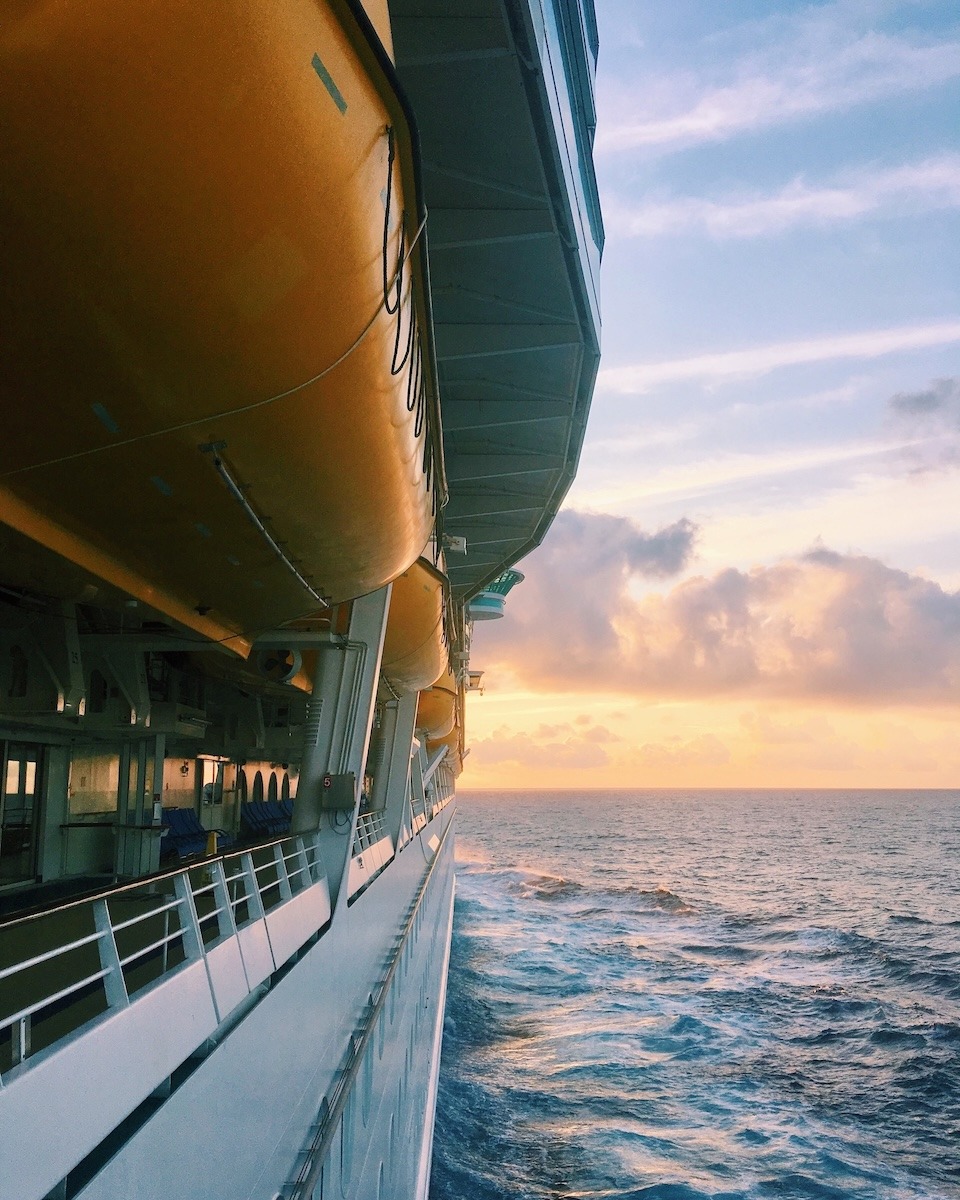
Step 7: Ace the Interview
Most interviews will be conducted virtually, either via video (Zoom or Skype) or phone.
Be prepared to show you’ve researched life as a crew member and your prospective position.
You’ll also be asked questions that demonstrate your personality and professionalism.
While challenging, the questions asked in the interview are pretty standard and shouldn’t be anything surprising.
Some additional interview tips:
- Test your tech (audio, video, internet connection) before your interview
- Triple-check your scheduled interview time and time zone
- Be in a quiet room with an appropriate background if on video
- Dress as if you’re going to an in-person interview if on video
Step 8: Check E-Mail Regularly for Offer of Employment
Don’t forget your spam folder!
After your interview, keep a close watch on your email so you don’t accidentally miss your offer of employment.
When you do receive one, be sure to respond as soon as possible.
If you wait too long, you could lose the offer.
Step 9: Onboarding
After you have your offer, your hiring manager will take you through the onboarding process.
This may include getting/submitting the following documents:
- C1/D visa if you’re not Canadian or American and have a port in the U.S.
- Valid passport
- Medical exam
- Background check
They should also send you a basic uniform list that will let you know what you need to come onboard with and what will be provided or purchased by you once you get on the ship.
If you need more insight about what to bring, you can also check out my post about what to pack for working on cruise ships.
The onboarding process can be quick for some and drag on for others– be prepared for anything!
If you haven’t heard back from your hiring manager after a couple of weeks of getting your contract offer, make sure to get in touch with them to guarantee you don’t fall through the cracks.
This happens on occasion, unfortunately, so be the proverbial (professional and friendly) squeaky wheel that gets the grease.
Step 10: Bon Voyage!
The last and final step to becoming a cruise ship crew member is receiving your official contract.
This will tell you your ship assignment, dates, and travel information to join the ship.
All that’s left is packing, saying your goodbyes, and getting ready for the adventure of a lifetime!
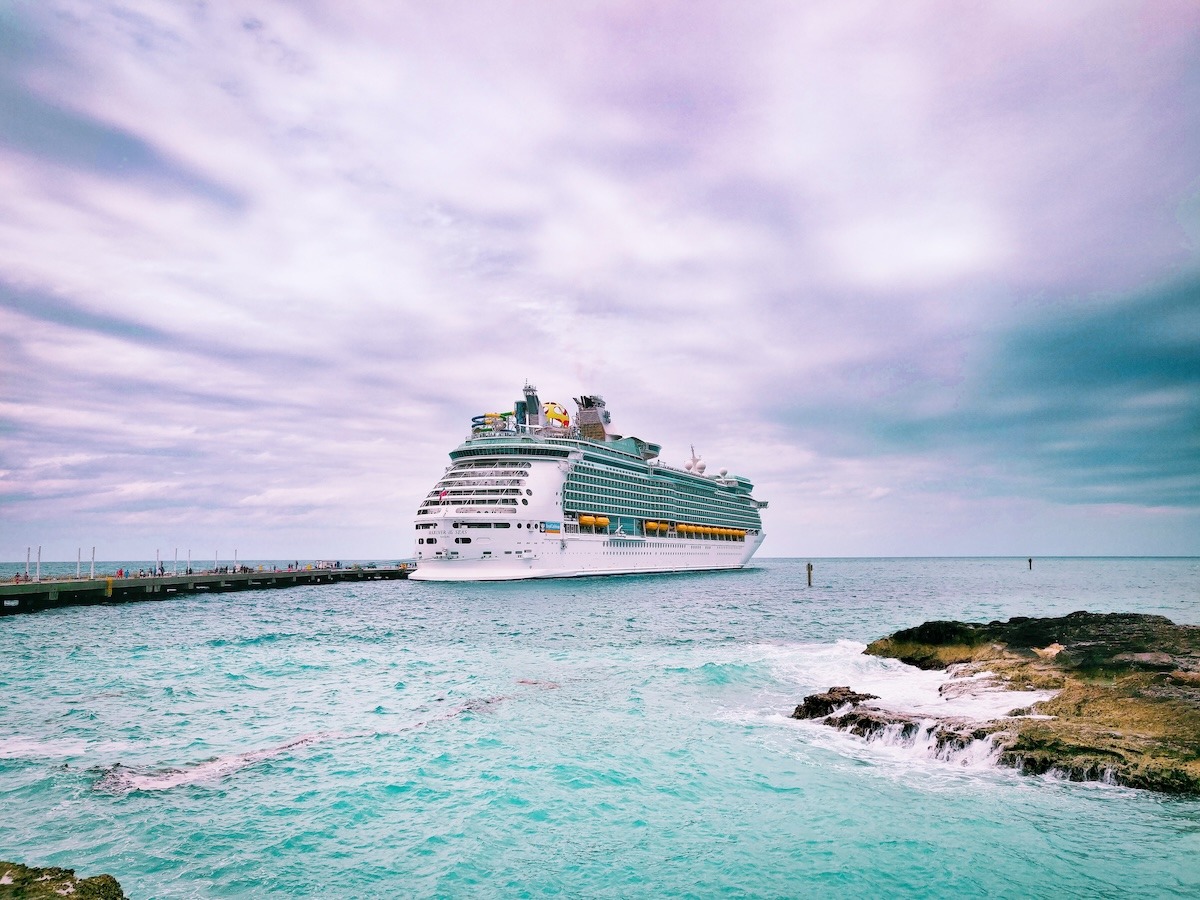
FAQ: How to Get a Job on a Cruise Ship
Is it hard to get a job on a cruise ship?
Cruise ship jobs are pretty competitive, so it may take some time before you get an offer of employment from a cruise line.
In order to give yourself the best chance possible at getting your application seen, be sure to follow all the steps and tips listed in this article.
What qualifications do you need to work on cruise ships?
Some basic qualifications required to work on cruise ships include:
- Typically between ages 18-50
- Valid passport
- Language fluency
- Pass a medical exam
- Pass a criminal background check
- Job specific qualifications
- STCW Basic Safety Training
How much do cruise ship jobs pay?
Cruise ship job salaries depend on your position.
For those of us in highly developed countries such as the United States, UK, and Australia, cruise ship jobs pay significantly less than minimum wage in our home cities.
For example, the minimum wage in my home city of San Francisco, California in 2019 was $15.59 an hour.
When I worked for Royal Caribbean in 2019 as a Youth Staff/Counselor, I was paid $2150 per month (before taxes).
With no days off, this broke down to approximately $77 per day.
If I worked an atypical 14-hour day during high season, this meant I earned $5.50/hour.
If I worked a shorter 8-hour day, this meant I earned $9.60/hour.
My position on ships was mid-tier (staff), so my pay wasn’t the lowest, but it was also far from the highest (Captain, officer, cruise director, etc.)
Generally speaking, a salary earned on cruise ships will go further in developing and less developed countries.
Keep in mind though that while onboard, crew members rarely have any bills as the following are covered during their contract:
- Accommodation
- Meals on ship
- Utilities
Also, for most crew members, the mandatory vacation time between contracts (6-8 weeks) is unpaid.
Can I work on a ship with no experience?
Yes, it is possible to work on ships with no experience.
But just keep in mind that these positions are the most competitive because of the low barrier to entry.
These positions are also typically the lowest paid jobs on board yet the most physically demanding.
Some of these ship jobs include:
- Laundry assistant
- Dishwasher
- Cleaner
- Deckhand

Final Thoughts: How to Get a Job on a Cruise Ship
The process of getting a job on a cruise ship isn’t so straightforward if you don’t know the process, but I hope these tips and tricks help!
Remember to be patient and diligent.
While it may take several months or even years for some– those who do put enough effort into getting a job working on ships eventually make it.
Wishing you fair winds and following seas ⚓️
Pin and Save for Later

